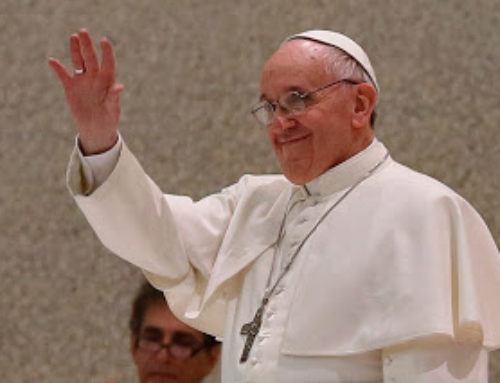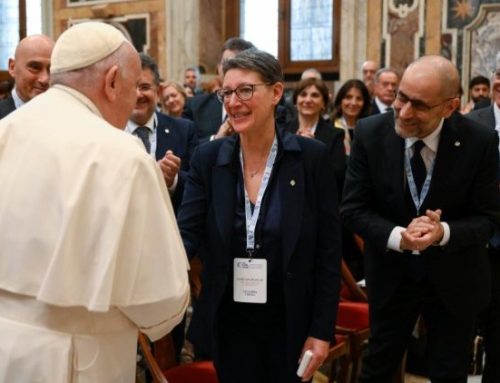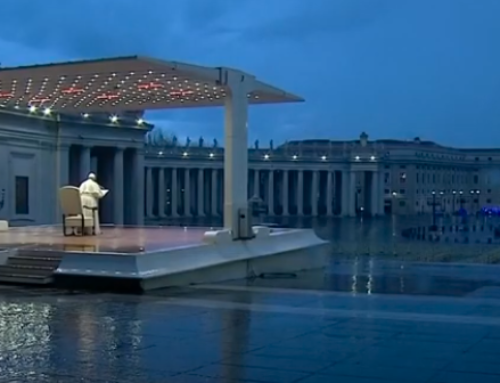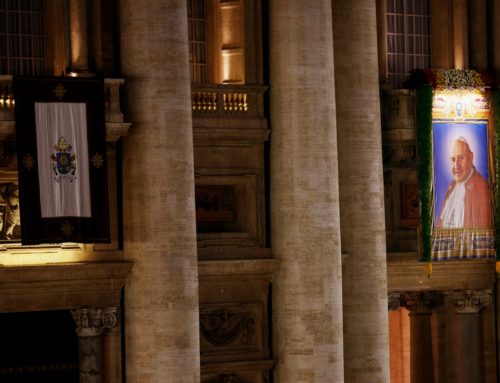* * *
Dear brothers and sisters, I give you my warm welcome. I thank Cardinal Montenegro for his introduction and I greet the Bishops present, the National Consultation, the Directors of the diocesan offices and their collaborators, who have come on the occasion of the 25 years of the World Day of the Sick and of the 20 years of the National Office for Health Pastoral Care.Fd
We thank the Lord for the progress made in this time, for what was done for the benefit of integral care of the sick, and for the generosity of so many men and women who accepted Jesus’ invitation to visit Him in the person of the sick (cf. Matthew 25:36). They were years marked by strong social and cultural changes, and today we can see a situation with lights and shadows. Scientific research has certainly gone forward and we are grateful for the precious results obtained to take care of, if not overcome, some pathologies. I hope that the same commitment will be assured for rare and neglected sickness, to which due attention is not always given, with the risk of giving rise to further sufferings. We praise the Lord also for the many health workers that with knowledge and conscientiousness live their work as a mission, ministers of life and participants in the effusive love of God the Creator; every day their hands touch the suffering flesh of Christ, and this is a great honor and a grave responsibility. We also rejoice for the presence of numerous volunteers that, with generosity and competence, do their utmost to alleviate and humanize the long and difficult days of so many sick and elderly alone, especially the poor and indigents. And I pause here to thank for the testimony of volunteer workers in Italy. It was a surprise for me. I never would have thought of finding something like this! There are so many volunteers that work in this realm. And this is work of the parish priests, of the great Italian parish priests, who were able to fight in this field. It is a surprise for me and I thank God for this.
Together with the lights, however, there are some shadows that risk aggravating the experience of our sick brothers and sisters. If there is a sector in which the disposable culture makes one see with evidence its painful consequences it is precisely that of health. When the sick person is not put at the center and considered in his dignity, attitudes are engendered that can lead even to speculate on others’ misfortune. And this is very grave! One must be vigilant, especially when patients are elderly with strongly compromised health, if they are affected by serious and onerous pathologies for their care or are particularly difficult, such as psychiatric patients. In the health realm, the business model has been adopted indiscriminately; instead of optimizing the available resources it risks producing rejected humans. To optimize the resources means to use in an ethical and supportive way and not penalize the frailest.
In the first place, is the inviolable dignity of every human person from the moment of his conception until his last breath (Message for the 25th World Day of the Sick 2017,December 8, 2016). It must not be money alone that orients the political and administrative choices, called to safeguard the right to health sanctioned by the Italian Constitution, in the choices of the one who manages places of care. The growing health poverty among the poorest bands of the population, due precisely to the difficulty of access to care, leaves no one indifferent and the efforts of all are multiplied so that the rights of the weakest are protected.
The history of the Italian Church knows many “inns of the Good Samaritan,” where sufferings have received the oil of consolation and the wine of hope. I am thinking in particular of the numerous health institutions of Christian inspiration. While I express to those present my appreciation for the good done, I encourage them to carry forward the inventiveness of charity proper of the Founders. In the present-day context, where the answer to the question of health of the frailest is revealed ever more difficult, do not hesitate also to rethink your works of charity to offer a sign of God’s mercy to the poorest who, with confidence and hope, knock at the doors of your structures.
Among the objectives that Saint John Paul II gave to the World Day of the Sick, in addition to the promotion of the culture of life, there is also that “of involving the dioceses, the Christian communities, the religious families in the importance of health pastoral care” (Letter to Cardinal Angelini for the institution of the W.D. of the Sick, May 13, 1992, 2). So many sick are in hospitals, but many more are in homes, ever more alone. I hope they will be visited frequently, so that they do not feel excluded from the community and can experience, by the closeness of one who meets them, the presence of Christ who passes today in the midst of the sick in body and in spirit. Unfortunately, “the worst discrimination of which the poor suffer – and the sick are poor in health – is the lack of spiritual attention. […] They need God and we cannot fail to offer them His friendship, His blessing, His Word, the celebration of the Sacraments and the proposal of a path of growth and maturation in the faith” (Apostolic Exhortation Evangelii gaudium, 200).
Sick people are precious members of the Church. With the grace of God and the intercession of Mary, Health of the Sick, may they be able to become strong in weakness (cf. 2 Corinthians 12:10), “and receive the grace to complete what is lacking in Christ’s afflictions for the sake of His Body, that is, the Church (cf. Colossians 1:24); a body that, in the image of that of the Risen Lord, keeps the wounds, sign of the harsh fight, but they are wounds transfigured for ever by love” (Homily for the Jubilee of Sick and Disabled Persons,June 12, 2016). Thank you!
[Original text: Italian] [Translation by Virginia M. Forrester]
…………………………………………..
Alle ore 12.20 di questa mattina, nella Sala Clementina del Palazzo Apostolico, il Santo Padre Francesco ha ricevuto in Udienza i partecipanti all’Incontro promosso dalla Commissione Carità e Salute della Conferenza Episcopale Italiana, alla vigilia della 25.ma Giornata Mondiale del Malato e in occasione dei 20 anni dell’Ufficio Nazionale per la pastorale della salute.
Riportiamo di seguito il discorso che il Papa ha pronunciato nel corso dell’udienza:
Discorso del Santo Padre
Cari fratelli e sorelle,
vi do il mio cordiale benvenuto. Ringrazio il Cardinale Montenegro per la sua introduzione e saluto i Vescovi presenti, la Consulta Nazionale, i Direttori degli Uffici diocesani e i loro collaboratori, venuti in occasione dei 25 anni della Giornata Mondiale del Malato e dei 20 anni dell’Ufficio Nazionale per la pastorale della salute.
Ringraziamo il Signore per il cammino compiuto in questo tempo, per quanto è stato fatto a beneficio di una cura integrale dei malati e per la generosità di tanti uomini e donne che hanno accolto l’invito di Gesù a visitarlo nella persona degli infermi (cfr Mt 25,36). Sono stati anni segnati da forti cambiamenti sociali e culturali, e oggi possiamo constatare una situazione con luci e ombre. Certamente, la ricerca scientifica è andata avanti e siamo riconoscenti per i preziosi risultati ottenuti per curare, se non per sconfiggere, alcune patologie. Auguro che il medesimo impegno sia assicurato per le malattie rare e neglette, verso le quali non sempre viene prestata la dovuta attenzione, con il rischio di dare adito a ulteriori sofferenze. Lodiamo il Signore anche per tanti operatori sanitari che con scienza e coscienza vivono il loro lavoro come una missione, ministri della vita e partecipi dell’amore effusivo di Dio creatore; le loro mani toccano ogni giorno la carne sofferente di Cristo, e questo è un grande onore e una grave responsabilità. Così pure ci rallegriamo per la presenza di numerosi volontari che, con generosità e competenza, si adoperano per alleviare e umanizzare le lunghe e difficili giornate di tanti malati e anziani soli, soprattutto poveri e indigenti. E qui mi fermo per ringraziare della testimonianza del volontariato in Italia. Per me è stata una sorpresa. Mai avrei pensato di trovare una cosa così! Ci sono tanti volontari che lavorano in questo ambito, convinti. E questo è opera dei parroci, dei grandi parroci italiani, che hanno saputo lottare in questo campo. Per me è una sorpresa e ringrazio Dio per questo.
Insieme con le luci, però, vi sono alcune ombre che rischiano di aggravare l’esperienza dei nostri fratelli e sorelle ammalati. Se c’è un settore in cui la cultura dello scarto fa vedere con evidenza le sue dolorose conseguenze è proprio quello sanitario. Quando la persona malata non viene messa al centro e considerata nella sua dignità, si ingenerano atteggiamenti che possono portare addirittura a speculare sulle disgrazie altrui. E questo è molto grave! Occorre essere vigilanti, soprattutto quando i pazienti sono anziani con una salute fortemente compromessa, se sono affetti da patologie gravi e onerose per la loro cura o sono particolarmente difficili, come i malati psichiatrici. Il modello aziendale in ambito sanitario, se adottato in modo indiscriminato, invece di ottimizzare le risorse disponibili rischia di produrre scarti umani. Ottimizzare le risorse significa utilizzarle in modo etico e solidale e non penalizzare i più fragili.
Al primo posto c’è l’inviolabile dignità di ogni persona umana dal momento del suo concepimento fino al suo ultimo respiro (Messaggio per la XXV Giornata Mondiale del Malato 2017, 8 dicembre 2016). Non ci sia solo il denaro a orientare le scelte politiche e amministrative, chiamate a salvaguardare il diritto alla salute sancito dalla Costituzione italiana, né le scelte di chi gestisce i luoghi di cura. La crescente povertà sanitaria tra le fasce più povere della popolazione, dovuta proprio alla difficoltà di accesso alle cure, non lasci nessuno indifferente e si moltiplichino gli sforzi di tutti perché i diritti dei più deboli siano tutelati.
La storia della Chiesa italiana conosce tante “locande del buon samaritano”, dove i sofferenti hanno ricevuto l’olio della consolazione e il vino della speranza. Penso in particolare alle numerose istituzioni sanitarie di ispirazione cristiana. Mentre esprimo ai loro rappresentanti qui presenti il mio apprezzamento per il bene compiuto, incoraggio a portare avanti la fantasia della carità propria dei Fondatori. Nei contesti attuali, dove la risposta alla domanda di salute dei più fragili si rivela sempre più difficile, non esitate anche a ripensare le vostre opere di carità per offrire un segno della misericordia di Dio ai più poveri che, con fiducia e speranza, bussano alle porte delle vostre strutture.
Tra gli scopi che san Giovanni Paolo II ha dato alla Giornata Mondiale del Malato, oltre alla promozione della cultura della vita, c’è anche quello «di coinvolgere le diocesi, le comunità cristiane, le famiglie religiose sull’importanza della pastorale sanitaria» (Lettera al Card. Angelini per l’istituzione della G.M. del Malato, 13 maggio 1992, 2). Tanti malati sono negli ospedali, ma molti di più sono nelle case, sempre più soli. Auspico che vengano visitati con frequenza, perché non si sentano esclusi dalla comunità e possano sperimentare, per la vicinanza di chi li incontra, la presenza di Cristo che passa oggi in mezzo ai malati nel corpo e nello spirito. Purtroppo «la peggior discriminazione di cui soffrono i poveri – e i malati sono poveri di salute – è la mancanza di attenzione spirituale. […] Hanno bisogno di Dio e non possiamo tralasciare di offrire loro la sua amicizia, la sua benedizione, la sua Parola, la celebrazione dei Sacramenti e la proposta di un cammino di crescita e di maturazione nella fede» (Esort. ap. Evangelii gaudium, 200).
Le persone malate sono membra preziose della Chiesa. Con la grazia di Dio e l’intercessione di Maria, Salute degli infermi, possano diventare forti nella debolezza (cfr2 Cor12,10), «e ricevere la grazia di completare ciò che manca in noi delle sofferenze di Cristo, a favore della Chiesa suo corpo (cfrCol1,24); un corpo che, ad immagine di quello del Signore risorto, conserva le piaghe, segno della dura lotta, ma sono piaghe trasfigurate per sempre dall’amore” (Omelia per il Giubileo delle persone malate e disabili, 12 giugno 2016). Grazie!
[00217-IT.01] [Testo originale: Italiano]








